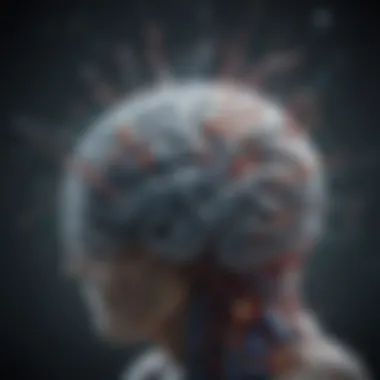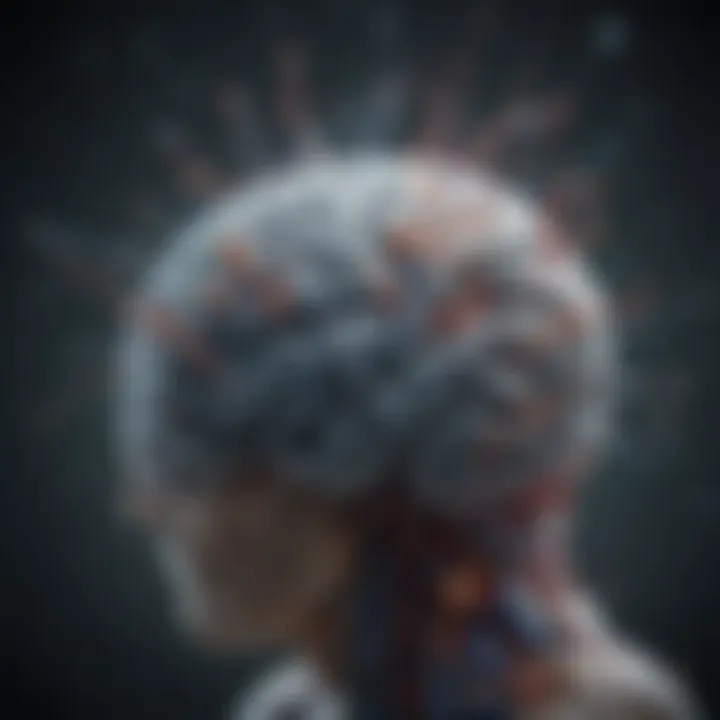Exploring the Multifaceted Causes of Depression and Anxiety


Intro
Mental health is a critical area of study that influences various aspects of human life. Among the numerous conditions affecting mental health, depression and anxiety stand out due to their prevalence and complexity. Understanding these conditions requires an examination of numerous intertwined factors, which can range from genetic predispositions to environmental triggers. The aim here is to uncover these intricate causes while considering modern research and perspectives.
In the following sections, we will explore significant research findings, why they matter, and break down difficult concepts into more understandable parts. By doing so, this article seeks to contribute to a more nuanced discussion on the mechanisms behind depression and anxiety, illuminating the pathways that could lead to more effective interventions.
Intro
Understanding the causes of depression and anxiety is crucial in today’s society. These mental health issues are prevalent, affecting millions across the globe. Recognizing the intricate interplay between various factors is essential for providing effective interventions. The exploration of these causes helps illuminate the underlying mechanisms linked to mental health disorders.
In this article, we will analyze the diverse factors contributing to depression and anxiety. These factors can be broadly categorized into biological, psychological, and environmental influences. Each plays a significant role in how individuals experience these conditions. For students, researchers, educators, and professionals, this understanding is not only interesting but also necessary for advancing mental health literacy.
Moreover, mental health awareness is gaining more importance in society. As stigma diminishes, more individuals seek help and understanding. This is a positive trend, but comprehending the complexities behind these mental health issues still remains a challenge. By delving deeper into the multifaceted causes, we can aid individuals in recognizing patterns, encourage open conversations, and support those in need. With this knowledge, society can work towards better mental health support systems.
"Mental health is not a destination, but a process. It’s about how you drive, not where you’re going."
To summarize, the relevance of the topic is profound. Addressing the causes of depression and anxiety contributes significantly to mental health awareness. It empowers individuals with crucial insights. This lays the groundwork for effective interventions and supports overall mental well-being.
Understanding Depression and Anxiety
Understanding depression and anxiety is crucial for various reasons. It allows for a clearer grasp of what individuals experiencing these conditions go through. The significance lies not only in recognizing the symptoms, but also in comprehending underlying causes. Mental health issues such as depression and anxiety affect millions worldwide. Grasping the complexity of these disorders can lead to enhanced support and treatment approaches.
More importantly, this understanding contributes to the reduction of stigma surrounding mental health. When people comprehend the nuances of these conditions, it fosters empathy and support within society. Patients often face misconceptions that exacerbate their experiences. By addressing and clarifying these issues, we move toward a more compassionate approach in healthcare.
Researchers and professionals benefit from this knowledge, as it opens pathways for innovative interventions. Enhanced awareness encourages discussions in educational settings, informing future generations. Understanding these topics ensures that techniques used for treatment and support are holistic and effective.
Definitions of Depression and Anxiety
Depression is a mood disorder characterized by persistent feelings of sadness and lack of interest in activities that once brought joy. Its symptoms can range from emotional disturbances to physical ailments, affecting daily life significantly. On the other hand, anxiety is marked by intense feelings of worry, fear, or apprehension. It often leads to avoidance behavior and is notably present in various forms such as generalized anxiety disorder, panic attacks, and social anxiety.
"Having a clear definition of these disorders aids in the early identification and treatment, thus reducing extended suffering."
Prevalence in Society
Both depression and anxiety are prevalent in contemporary society. Statistics indicate that around 264 million people globally experience depression, while anxiety disorders affect about 284 million individuals. These figures reveal the widespread nature of mental health issues, making it a public health concern that cannot be ignored.
Factors contributing to the prevalence include:
- Stressful life events: High-stress experiences such as loss, trauma, or major life changes can trigger these disorders.
- Socioeconomic factors: Individuals from lower socioeconomic backgrounds often face heightened stress, affecting mental health.
- Cultural perception: Societal attitudes towards mental health can hinder individuals from seeking help.
Recognizing the prevalence of depression and anxiety informs both the public and health professionals, reinforcing the need for effective prevention and intervention strategies.
Biological Factors
Biological factors play a crucial role in understanding depression and anxiety. These factors encompass genetic predispositions, neurochemical processes, and hormonal influences. By examining these elements, we gain insights into how biological systems may contribute to the onset and persistence of these mental health conditions. Recognizing the biological underpinnings can also inform treatment approaches and enhance overall understanding of mental health.
Genetic Influences
Genetics significantly impact the likelihood of developing depression and anxiety. Research indicates that these conditions tend to run in families. Specific genes are associated with mood regulation and brain function. For instance, variations in the serotonin transporter gene have been linked to mood disorders.
Key points to consider:
- Genetic predisposition doesn’t determine fate. Environment interacts with genetics.
- Family history can elevate risks, but it’s not definitive.
- Genetics can influence the effectiveness of treatment options.
Neurochemical Imbalances
Neurotransmitters play a vital role in mood regulation. An imbalance in these chemicals can lead to symptoms of depression and anxiety. Serotonin, norepinephrine, and dopamine are particularly significant. When these neurotransmitters are not functioning optimally, it can result in mood disturbances.
Understanding neurochemistry involves:


- Recognizing that medication can help restore balance.
- Considering lifestyle changes to support neurotransmitter function.
- Acknowledging that physical health impacts mental health.
"Neurochemical imbalances do not singulate people to a life of ailment, often, behaviors can alter these levels efficiently."
Hormonal Changes
Hormones can significantly affect mood. Changes in hormone levels during puberty, pregnancy, or menopause often correlate with higher instances of depression and anxiety. For instance, fluctuations in estrogen and progesterone during menstrual cycles can provoke mood variations in some women.
Important aspects include:
- Hormonal levels can influence treatment responses.
- Awareness of personal hormonal cycles can aid in management.
- Certain medical conditions, such as thyroid disorders, may lead to hormonal imbalances, increasing mental health risks.
By examining these biological factors, we can appreciate their contributions to mental health. This understanding adds depth to the discussion on how to effectively address depression and anxiety, paving the way for a more tailored approach to intervention.
Psychological Factors
Psychological factors play a crucial role in understanding the complex nature of depression and anxiety. These factors encompass various elements such as cognitive patterns, personality traits, and emotional responses, all of which contribute to how individuals perceive and react to their environments. An exploration of these factors reveals not only the underlying reasons for the onset of these mental health issues but also offers insights into how they can be addressed. By recognizing these psychological influences, we can tailor interventions to better support individuals affected by depression and anxiety.
Cognitive Distortions
Cognitive distortions refer to the inaccurate or exaggerated thought patterns that can contribute to negative feelings and behaviors. These mental processes involve various schemes through which individuals interpret their experiences. For example, a person might engage in all-or-nothing thinking, viewing situations in extreme terms without recognizing any middle ground. Similarly, overgeneralization can lead one to draw broad conclusions based on a single instance.
These cognitive distortions are significant as they can exacerbate feelings of hopelessness and inadequacy, which are common in depression and anxiety. It limits one’s ability to see situations realistically and promotes a cycle of negativity. Addressing these distortions is a key component of cognitive behavioral therapy, which aims to help individuals recognize and challenge their faulty thinking.
Cognitive distortions not only affect mental health but also influence decision-making and interpersonal relationships.
Practical strategies for mitigating cognitive distortions include:
- Identifying and documenting negative thoughts.
- Challenging these negative thoughts by considering alternative interpretations.
- Using evidence-based reasoning to evaluate the validity of thoughts.
Personality Traits
Personality traits can also influence the susceptibility to depression and anxiety. Certain traits may predispose individuals to developing these conditions. For instance, those with high levels of neuroticism are generally more prone to experiencing negative emotional states. Similarly, introverted individuals may struggle more with social situations, potentially leading to heightened anxiety.
Conversely, traits such as resilience can act as protective factors. Individuals with a resilient personality tend to cope better with stress and adversity, which lowers their risk for mental health issues. Understanding how personality traits interact with life experiences can give insight into why some people develop depression or anxiety while others do not.
Notable personality traits that may affect mental health include:
- High Neuroticism: This trait is linked to a higher likelihood of experiencing anxiety and mood disorders.
- Low Extraversion: Introversion can correlate with social anxiety and depressive symptoms.
- Resilience: Resilient individuals often recover from setbacks and maintain better mental health.
By examining and understanding these psychological factors, we not only gain insights into individualized experiences of depression and anxiety but also identify paths for effective intervention and support.
Environmental Influences
Life Events and Trauma
Life events greatly impact mental health. They can range from the death of a loved one to significant changes like divorce or job loss. Such transitions often introduce stress and uncertainty. Trauma, particularly if repeated or severe, can lead to long-lasting psychological effects. This includes post-traumatic stress disorder (PTSD), which might stem from experiences like abuse or natural disasters.
Research shows that individuals exposed to traumatic events may exhibit changes in brain function. These changes can potentially alter stress response mechanisms. Understanding this can help us recognize why some individuals develop anxiety or depression after experiencing trauma while others may not.
"Traumatic experiences can manifest as long-term emotional distress and alterations in cognitive patterns."
Socioeconomic Status
Socioeconomic status influences mental health in multiple ways. People from lower socioeconomic backgrounds may face higher levels of stress, reduced access to healthcare, and limited social support. Economic instability can intensify feelings of helplessness. The stresses of daily life may make it difficult to access resources that promote mental health wellbeing.
Studies suggest that individuals with lower socioeconomic status experience a higher incidence of mental health disorders. This correlation indicates a need for targeted support services that cater to vulnerable populations. Addressing economic disparities can significantly improve overall mental health outcomes.
Cultural Factors
Cultural context shapes perceptions of mental health. Different cultures have unique beliefs and stigmas surrounding mental illness. In some communities, seeking help may be frowned upon, leading to underdiagnosis or delayed treatment. Cultural values can also dictate coping styles and social support systems.


A deeper understanding of cultural factors assists in crafting effective interventions. This is particularly important when developing outreach programs that address mental health issues within specific communities. Sensitivity to these factors can effectively bridge gaps in services and enhance mental health literacy.
In summary, environmental influences are pivotal in understanding depression and anxiety. Addressing factors like life events, socioeconomic status, and cultural beliefs can help provide clearer insights into mental health challenges. Engaging with these influences allows researchers and practitioners to better tailor interventions to meet diverse needs.
The Role of Stress
Stress plays a significant role in the development and exacerbation of depression and anxiety. It is essential to understand how stress interacts with other factors to impact mental health. The relationship between stress and mental health is multifaceted and has implications for both the individuals experiencing these conditions and the broader community. By identifying and addressing stressors, one can mitigate their impact, ultimately fostering better mental health outcomes.
Chronic Stress and Mental Health
Chronic stress refers to a prolonged and persistent feeling of stress that can significantly affect mental health. Over time, this type of stress can lead to changes in brain chemistry, resulting in emotional disorders such as depression and anxiety. The interplay between chronic stressors, like work pressures or personal issues, can create a cycle where mental health deteriorates, leading to more stress. Symptoms can include:
- Irritability
- Sleep disturbances
- Cognitive impairments
- Reduced motivation
It's crucial to note that chronic stress doesn't just affect mood; it can alter physiological processes too. For instance, elevated cortisol levels can disrupt sleep and appetite, fueling a downward spiral into mental health issues. Thus, recognizing and addressing chronic stressors is vital for preventing depression and anxiety in many individuals.
Stress Response Systems
The body has developed stress response systems that are critical in managing threats. These systems are primarily controlled by the hypothalamic-pituitary-adrenal (HPA) axis. When faced with stressors, the body reacts through a series of responses, including:
- Release of hormones: Cortisol and adrenaline are released to prepare the body for a fight-or-flight response.
- Increased heart rate: The heart pumps faster to deliver oxygen to muscles and organs.
- Changes in immune function: The body prioritizes immediate survival, which can lead to weakened immunity over time.
However, when stress becomes chronic, these systems can become dysregulated. This dysregulation may lead to a state of heightened arousal or anxiety, making it challenging for individuals to cope effectively. Understanding how these stress response systems operate is critical. It allows for the development of interventions aimed at reducing stress and promoting resilience.
"Understanding the role of stress is fundamental to addressing mental health issues effectively. By managing stress, individuals can improve their overall emotional well-being."
By understanding the physiological and emotional aspects of stress, individuals can better prepare to combat its effects on their mental health. This awareness can guide not only personal coping strategies but also collective efforts to create supportive environments.
Social and Relational Factors
Social and relational factors play a crucial role in understanding the complexities of depression and anxiety. These factors encompass the types of relationships individuals maintain, the social networks they are part of, and the collective experience of society. Communication and connection with others can either buffer against or exacerbate mental health struggles.
Interpersonal Relationships
Interpersonal relationships significantly influence mental health. Positive relationships can provide emotional richness and stability, serving as a protective buffer against emotional distress. Friendships and family connections often offer a sense of belonging that is vital for mental wellness. Conversely, negative interpersonal interactions can lead to feelings of isolation and worthlessness, which are common precursors to mental health issues.
For instance, conflict with a close friend or family member can trigger or worsen symptoms of anxiety and depression. Individuals may feel unable to cope, leading to withdrawal from others and further exacerbation of their mental state. The dynamics of relationships are thus essential to consider when exploring individual mental health.
Social Support Systems
Social support systems encompass the resources available to individuals for assistance in emotional and practical situations. These systems can take many forms including friends, family, support groups, and online communities. A robust social support network can significantly reduce the prevalence of depression and anxiety by providing reassurance, validation, and encouragement.
Studies have shown that individuals with strong social support systems report lower levels of stress and improved coping strategies. This support can take various forms:
- Emotional Support: This includes empathetic listening and unconditional regard, which can warrant open discussions about mental health struggles.
- Practical Support: This can involve daily help with tasks or financial assistance, which can lift burdens during harder times.
- Informational Support: This provides advice and resources that persons can utilize to tackle their situations effectively.
"The presence of supportive social networks has been associated with reduced risks of mental illness."
In summary, social and relational factors are pivotal in shaping individual experiences of depression and anxiety. Building strong interpersonal relationships and fostering reliable social support systems can provide substantial benefits, helping individuals navigate the challenges posed by mental health issues.
Coping Mechanisms and Behavioral Patterns
Coping mechanisms and behavioral patterns play a significant role in how individuals respond to the challenges posed by depression and anxiety. Understanding these mechanisms sheds light on the ways in which people attempt to manage their mental health. The approaches one uses can be either adaptive or maladaptive. Evaluating these patterns help in promoting mental well-being and developing effective interventions.
Maladaptive Coping Strategies
Maladaptive coping strategies are methods that may provide short-term relief but ultimately exacerbate mental health issues. Common examples include avoidance, denial, and aggressive behavior. Avoidance behavior, such as withdrawing from social situations or procrastinating on tasks, can provide a temporary escape from stress but leads to increased feelings of isolation and anxiety over time.
Denial is another prevalent maladaptive strategy. Individuals may refuse to acknowledge their mental health condition or their problems, believing that by ignoring them, they will fade away. This can prevent seeking necessary help, leading to worsening symptoms.
Some individuals turn to aggressive behavior, such as anger outbursts, which might give a false sense of power but can damage relationships and create further distress. These strategies are counterproductive and reinforce negative cycles. Encouraging individuals to recognize these patterns is essential in helping them seek healthier methods of coping.


"Understanding one’s maladaptive coping strategies is the first step toward change."
Risky Behaviors and Substance Abuse
Risky behaviors, including substance abuse, emerge as common responses to cope with depression and anxiety. Individuals may engage in alcohol use or drug consumption to numb their emotional pain. This often provides immediate relief but leads to deeper issues, including addiction and a host of physical health problems.
Engaging in risky activities, whether reckless driving, dangerous sports, or engaging with untrustworthy individuals, can similarly signify a struggle. These behaviors can escalate the existing mental health issues, creating a vicious cycle where relief is temporary, but consequences are severe.
The relationship between mental health and substance abuse is complex. When individuals experience anxiety or depressive episodes, the temptation to seek instant gratification through substances or risky behaviors can be strong. Recognizing the interplay between these choices and mental health is crucial. Establishing healthier coping alternatives can significantly contribute to recovery and improved quality of life.
Interventions and Treatments
Interventions and treatments for depression and anxiety play a crucial role in alleviating suffering and improving the quality of life for those affected. Understanding these approaches can provide hope and guidance for individuals seeking relief, as well as for professionals involved in mental health care. This section will explore various therapeutic approaches, medications, and their corresponding effects on mental health.
Therapeutic Approaches
Therapeutic approaches often target the root causes of depression and anxiety, leading to sustainable improvements. Common forms of therapy include Cognitive Behavioral Therapy (CBT), interpersonal therapy, and mindfulness-based therapies.
- Cognitive Behavioral Therapy focuses on altering negative thought patterns that contribute to anxiety and depression. It helps individuals recognize detrimental thoughts and replace them with more balanced perspectives.
- Interpersonal Therapy emphasizes improving communication and relationships. Understanding how interpersonal conflicts can affect mood plays a substantial part in reducing symptoms of mental disorders.
- Mindfulness-based therapies advocate for present-moment awareness, encouraging individuals to engage with their thoughts and feelings non-judgmentally. This can lead to increased emotional regulation and a reduction in anxiety.
The flexibility of these therapeutic approaches allows them to be tailored to individuals' specific needs, contributing to their effectiveness. It is essential to find a qualified therapist to ensure a safe and productive therapeutic experience.
"Effective therapy is not a one-size-fits-all solution, but rather a deeply personal journey that must be approached with care."
Medications and Their Effects
Medications can supplement therapeutic approaches, addressing biochemical imbalances that often contribute to depression and anxiety. The primary types of medications include antidepressants, anxiolytics, and mood stabilizers. Each class of medication offers different mechanisms and benefits.
- Antidepressants, such as selective serotonin reuptake inhibitors (SSRIs) like fluoxetine and sertraline, increase serotonin levels in the brain, which may improve mood.
- Anxiolytics, like benzodiazepines, can provide rapid relief from anxiety symptoms, though they are typically prescribed with caution due to their potential for dependency.
- Mood stabilizers, such as lithium, can be effective in managing mood swings for individuals with certain mood disorders.
However, the use of medications must be carefully considered, as side effects and interactions with other drugs can occur. Close communication with a healthcare provider is crucial to ensure the right treatment plan is followed.
The Importance of Awareness and Education
Awareness and education about mental health are crucial aspects in understanding and addressing the causes of depression and anxiety. These factors can significantly influence societal attitudes and behaviors towards those affected by these conditions. Promoting awareness reduces stigma and encourages discussions about mental health, fostering an environment where individuals feel safe to seek help.
Stigma Around Mental Health
Stigma remains one of the largest barriers to mental health treatment. For many, the fear of being judged prevents them from discussing their mental health challenges. This stigma can stem from cultural beliefs, misinformation, and lack of understanding about mental health issues. When society views depression and anxiety as personal weaknesses rather than legitimate health concerns, it discourages individuals from admitting their struggles.
The negative perceptions can lead to isolation and exacerbate mental health conditions. People may avoid reaching out to friends and family due to the fear of ridicule. This lack of support can intensify feelings of loneliness, furthering the cycle of depression and anxiety.
"Awareness can dismantle stereotypes and promote understanding of depression and anxiety, allowing more people to seek help."
Promoting Mental Health Literacy
Mental health literacy involves understanding what mental health means and how to recognize mental health conditions. It also includes knowing how to access treatment and how to help others. Increasing mental health literacy can empower individuals to take charge of their well-being.
Education on mental health should start early in schools and continue through all life stages. Teaching children about emotions and coping mechanisms can build strong foundations. Important aspects of promoting mental health literacy include:
- Understanding Symptoms: Recognizing signs of depression and anxiety is vital for early intervention.
- Access to Resources: Providing information on where to seek help is crucial. This includes understanding the roles of therapists, counselors, and support groups.
- Encouraging Open Conversations: Fostering environments where mental health can be discussed without fear of judgment can encourage those affected to voice their struggles.
End
The conclusion of this article serves as a critical summation of the various causes of depression and anxiety. It is essential to understand that these mental health issues do not arise from a single source. Instead, they emerge from a complex interplay of biological, psychological, environmental, and social factors.
Importance of Understanding Mental Health
The importance of awareness around mental health cannot be overstated. Depression and anxiety can affect anyone, regardless of age, gender, or social status. A solid understanding of the factors contributing to these conditions can lead to more effective interventions, better coping mechanisms, and a greater emphasis on supportive communities.
The implications of this topic extend beyond personal struggles. Recognizing the multifaceted nature of mental illness facilitates a broader dialogue about health, encouraging individuals and communities to seek help and offer support.
Key Takeaways
- Holistic Perspective: It is vital to approach mental health issues from a holistic perspective, incorporating various factors. Each aspect, from genetics to environment, plays a role in shaping an individual’s mental state.
- Reducing Stigma: Greater awareness can contribute to reducing the stigma surrounding mental health. When society understands that depression and anxiety are not merely personal failings but complex interplays of numerous influences, they may be more willing to support those in need.
- Intervention Strategies: Education about these causes also leads to improved intervention strategies. Therapists and mental health professionals can tailor their approaches based on an individual’s specific circumstances, increasing the chances of successful outcomes.
In summary, this exploration underscores the necessity of ongoing research and education about mental health. By highlightinbg the complexity of depression and anxiety, we encourage a more informed and compassionate society that is well-equipped to handle these widespread challenges.















